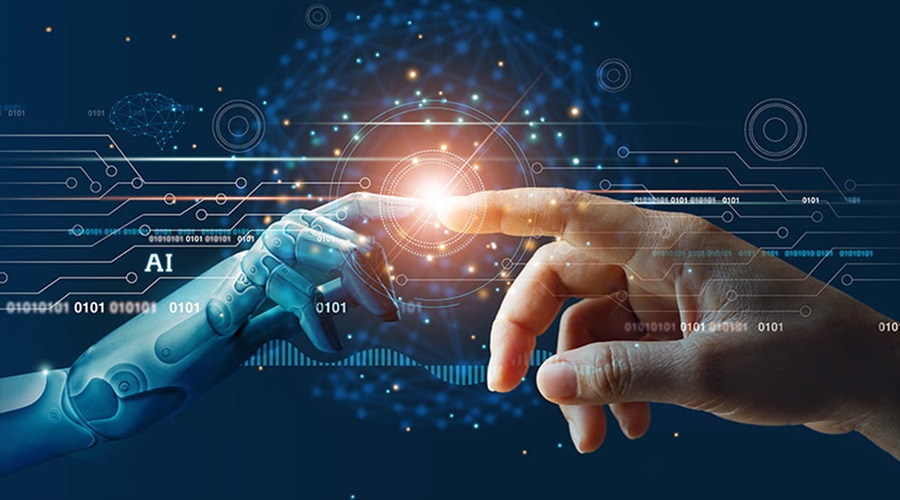
AI and ML are enabling and allowing companies to drive down costs, automate work, and remain ahead of the competition. Discover how these technologies can drive success for your business in the digital age.
The era of digital revolution has changed the way businesses are run. Conservative approaches cannot help you keep up with the competition anymore. In the modern world, businesses require quicker decision-making, improved knowledge of customers, and rational operations. Artificial Intelligence (AI) and Machine Learning (ML) come in here. These are no longer ideas of the future or concepts, but now they are implemented tools that businesses employ in their daily operations.
AI means systems that simulate human intelligence. ML (Machine Learning) is an aspect of AI where machines learn from data and improve. Together, they will have the ability to gain intelligence, predict outcomes, and automate actions at scale. This contributes to increased efficiency, cost reduction, and a more intelligent strategy for companies.
However, while many businesses understand the importance of AI and ML, they often struggle to integrate these technologies into their existing workflows. This is where partnering with an experienced AI/ML development company can help identify the right opportunities, build scalable models, and implement solutions that align with core business goals.
Let’s gain insight into how AI/ML technologies contribute to business development and how they play a big deciding role in businesses now.
How AI and Machine Learning Contribute to Your Business Growth

1. Enhancing Decision-Making with Real-Time Insights
AI and ML enable companies to make more intelligent decisions based on facts. Companies are no longer forced to use intuitive judgments or older reports, but they can now make use of predictive analytics to establish trends, customer behavior, and possible risks. For example, a retail firm uses historical sales, weather reports, and trends on social media to predict product demand. This helps in better inventory control and in stockouts and overstockings.
The real-time dashboards based on AI will enable the decision-makers to make swift moves on marketing campaigns, pricing strategies, and operations based on real data. This agility means that businesses are adaptable to volatile markets.
2. Automating Repetitive Tasks
Automation is one of the greatest benefits of AI/ML. These technologies can perform the repetitive and time-consuming tasks of data entry, generation of reports, customer support, and scheduling. Let us take customer support as an example. Chatbots with the help of AI will be able to respond to the most frequent questions, transfer tickets to the right specialists, and be available any day and at any time. This saves the time of your team, and not only that, the customer experience is also improved.
Finance departments can use ML tools to automate the processing of invoices, fraud detection, and checks of compliance. It results in the reduction of turnaround times and errors. Employees can perform more valuable and creative work and specific tasks by automating routine tasks.
3. Personalizing Customer Experiences
Today, customers demand personal service, whether when they shop or when they call in to a support office. The application of AI and ML enables businesses to provide unique experiences and are able to research the user data, browsing behavior, purchase history, and other preferences. As an example, ML algorithms in E-commerce websites recommend products to a customer that they might be interested in, depending on what they had viewed earlier or what they had purchased in the past.
This increases traffic and higher conversions. The use of AI in marketing allows one to develop dynamic email marketing campaigns that will appear to each customer according to their interests. In the long term, such individualized relationships enhance bonding with a customer and raise loyalty.
4. Optimizing Marketing Strategies and Campaigns
Digital marketing is evolving with AI and ML. They help marketers to access prospective customers, reduce ad costs, and make campaigns successful with precision. Machine learning algorithms use huge data from adverts, such as click-through rates, audience interests, and user activity, to be able to know what succeeds and what fails. Based on these insights, marketers can modify the content, test targeting, or reallocate funds.
A/B testing on a large scale is also made possible by AI tools. You are able to experiment with various headings, images, or calls-to-action on various audience segments. During the campaign, ML automatically detects which versions are doing the best and moves the focus in that direction.
5. Strengthening Cybersecurity and Fraud Detection
Cybersecurity is important as businesses become digital. AI and ML play an essential role in identifying threats in time and securing sensitive data. The old security solutions are based on rules, which is not the case with AI and ML. They are constantly fed with data and can respond to new forms of threats. For example, when a system that runs the banking system notices abnormal activities in terms of transactions, ML models may highlight it immediately so that it can be checked.
Within e-commerce and fintech, AI systems identify payment fraud, false accounts, and identity theft. Such systems are able to read thousands of transactions per second and to detect abnormalities very accurately.
6. Streamlining Supply Chain and Logistics
AI and ML are streamlining the whole supply chain, including procurement, inventory management, delivery, and returns. Such technologies enhance demand prediction, routes, and warehouse management. For example, a logistics company may analyze traffic, weather, and delivery with the help of ML. On these grounds, AI will be able to propose the most efficient and fuel-saving courses of delivery.
Through AI, retailers can monitor the availability of products in real-time, anticipate restocking, and automate warehouses. The outcome is reduced cost of operation, fewer delays, and high customer satisfaction.
7. Improving Product and Service Quality
AI and ML enable companies to detect defects, anticipate the malfunction of equipment, and enhance product quality. Computer vision systems based on AI are available to be used on assembly lines and help manufacturers properly inspect their products. Such systems are better at detecting defects as compared to human beings. At software companies, ML algorithms are able to detect bugs or problems by observing user and system logs. This enables teams to sort out flaws before they are noticed by the user.
Businesses through AI also collect feedback, reviews, and support queries in order to find out what people are complaining about. Through dealing with them proactively, the companies can constantly advance their offerings and improve the satisfaction of the users.
8. Driving Innovation and New Business Models
ML and AI present opportunities for innovation. The power of smart systems enables businesses to explore new products, services, or even different industries. There are streaming services such as Netflix and Spotify where ML is used to suggest content. This has created all new forms of consumption and money-making approaches. Similarly, AI is being utilized by ride-sharing firms that combine drivers and customers, foresee demand, and establish variable prices.
Voice assistants, smart gadgets, and predictive healthcare AI are also on the rise. These innovations not only serve the needs of the customers but also develop new revenue sources.
9. Making HR and Talent Management Smarter
AI is changing talent management in companies. ML tools help HR departments take more data-driven decisions, be it hiring employees or keeping them. In hiring, AI can also check resumes, match candidates to jobs, and even conduct initial video interviews with sentiment analysis. This makes hiring faster, and it lowers biases that are human.
After successfully hiring the employees, AI can forecast the possibility of attrition, recommend training courses, and monitor the performance indicators. The insights can assist the HR teams to retain the best talent and create a more engaged team.
10. Enabling Scalability and Cost Optimization
AI/ML systems are scalable. Be it 100 or 10,000 customers, intelligent systems are flexible and scale with your company. This scalability also assists companies to increase the demand without increasing their cost in proportion. AI on the cloud also eliminates the cost of infrastructure. The APIs, pay-as-you-go, or Software as a Service (SaaS), give small and medium businesses access to powerful tools.
Artificial intelligence assists in reducing costs by optimising resource consumption, automating critical processes, and hence increasing performance. Such a combination of growth and efficiency is important in a competitive digital economy.
How to Get Started with AI/ML in Your Business

- Find essential business issues that can be addressed through AI/ML.
- Establish concrete goals for your AI /ML efforts.
- Answer how good and available your business data is.
- Start with small pilot projects to test impact and feasibility.
- Select stable AI tools or partners to assist in implementation.
- Educate your employees to be familiar with AI technologies.
- Maintain the privacy of the data and adhere to the law.
- Consistently monitor your performance and optimize your AI models.
Conclusion
AI and ML are powerful tools that companies can use to grow and thrive in the digital age. They make work faster, reduce errors, and help you know your customers. These technologies have numerous advantages, including automation of the work, effective marketing, and good decisions.
It also allows businesses of all sizes to make small beginnings and experience big outcomes in the long term. AI/ML can make a difference with the right plan, tools, and training. In a rapidly evolving world, AI and ML implementation prove to be one of the most effective methods of staying competitive, reducing expenses, and providing customers with higher-quality products or services.






